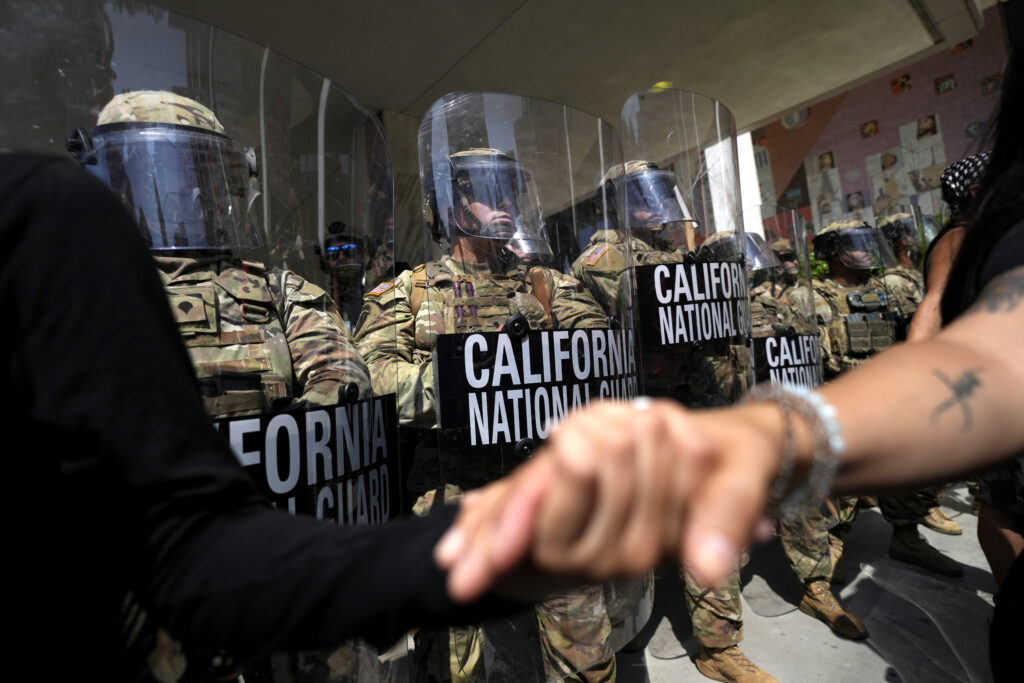
A federal judge in a hearing Thursday appeared deeply skeptical of the Department of Justice’s (DOJ) legal defense of President Donald Trump federalizing the California National Guard in response to largely peaceful protests in Los Angeles.
The hearing was over California and Gov. Gavin Newsom’s (D) request for a court order that would limit troop’s authorities to protecting federal buildings in the city.
Newsom and the state sued Trump earlier this week, arguing that his order federalizing around 4,000 California National Guard soldiers was “unprecedented,” “unlawful” and a direct violation of both the Constitution and federal law.
Currently, the Department of Defense has authorized soldiers to accompany ICE officials on raids and temporarily detain civilians. Those authorities get military personnel increasingly close to direct law enforcement, which under normal circumstances is prohibited by the Posse Comitatus Act.
Judge Charles Breyer, the brother of former Supreme Court Justice Stephen Breyer who was appointed by former President Bill Clinton, said he hopes to issue an order by the end of the day Thursday.
“I’m prepared to address that issue,” Breyer said of whether Trump properly federalized the National Guard.
In a memo over the weekend, Trump attempted to federalize the California National Guard by citing 10 U.S.C. 12406, an archaic statute that allows the president to mobilize the Guard when the country faces foreign invasion or rebellion or when the president is unable to execute laws with regular resources.
The president claimed there was a “rebellion” against the U.S. government, citing unspecified “incidents of violence and disorder.”
However, the statute specifies that orders issued under it “shall be issued through the governors of the States or, in the case of the District of Columbia, through the commanding general of the National Guard of the District of Columbia.”
In its lawsuit, California alleged that recent anti-ICE protests couldn’t constitute a rebellion and that the Trump administration illegally circumvented Newsom’s authority as commander-in-chief of the California National Guard. The state argued that, at the very least, the statute requires governors to be consulted on calling Guard troops into federal service.
The DOJ, represented by Assistant Attorney General Brett Shumate, argued in the hearing Thursday that the judge should not issue an order because the courts have no authority to review the president’s determination of what an invasion, rebellion or inefficient regular resources are.
The judge seemed alarmed by that argument, saying it seemed antithetical to a democracy and closer to a monarchy.
“How is that different than what a monarchist does? He says certain things, he finds certain things, he does certain things. That’s not where we live,” the judge said. “We live in response to a monarchy.”
After the judge asked the DOJ whether orders were issued through Newsom, Shumate argued that governors are only “conduits” for the president’s order, meaning they don’t need to be consulted.
To this, Breyer questioned why lawmakers would even have included governors in the statute if that were the case.
“I’m trying to figure out how something is ‘through’ somebody if in fact you didn’t give it to him,” Breyer said, noting that the record reflects that orders were only sent to military officials.
Breyer appeared poised to deny California’s request that his order also address Trump’s deployment of 700 Marines to Los Angeles. He recognized the state’s concern that using marines could violate Posse Comitatus but didn’t want to speculate about what the government might do and would rather address a “real” violation.
Experts told Democracy Docket that Trump’s deployment of the military to Los Angeles undermines federal law barring the government from using military personnel in civilian law enforcement and may lead to further overreach.
Whereas past presidents have used the military for specific and limited purposes, Trump’s presidential memorandum federalizing the Guard is limitless, potentially meaning it could be used against any state.
